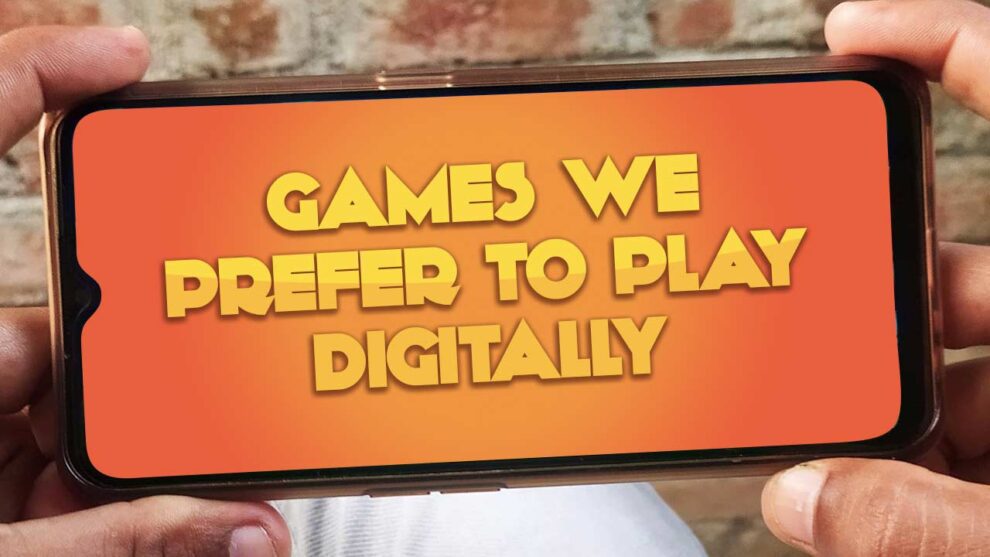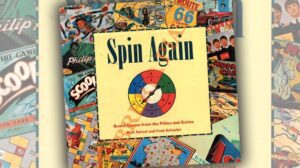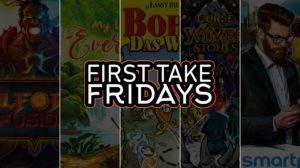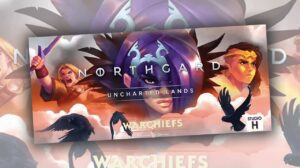As with most gamers, we also spend time playing some of those same board games online. The number of board gaming sites online, and the quality of their implementations, have made this a viable alternative. At times, it’s even the preferred alternative.
Here are five Meeple Mountaineers and the reasons why they’d rather play some games digitally.
Tom Franklin
Onirim
Onirim was the first of the Oniverse solo games by designer Shadi Torbey. In Onirim, you’re a Dreamwalker, trying to find all eight of the Oneiric doors before your dream ends. All this plays out with a big deck of over 70 cards featuring the trippy, dreamlike artwork of Élise Plessis.
To play, shuffle the deck of Dreams, Doors, and Nightmare cards. Deal yourself a starting hand five cards. On a turn, you’ll play a card from your hand, then draw one from the deck. Played cards are placed on the table, in a row from left to right, with the last card played on top. If you play three cards in a row of the same color and whose upper left symbols are not repeated in a row, you’ll unlock one of the Oniric Doors of that color. Unlock all eight doors and you win the game.
However, when you do unlock a door, you’ll need to go through the deck to find it—and then reshuffle the deck. If you draw one of the doors and have a matching colored key card in your hand, you unlock the door. If not, you’ll need to set it aside and then reshuffle the deck at the end of your turn. This may not seem like much, but I’ve played Onirim and had to reshuffle the deck 6-7 times, which ends up being a lot of shuffling.
The digital version takes care of all that shuffling, allowing me to concentrate on the game itself, and not the shuffling and reshuffling.
Scythe
Scythe is a worker placement game where you are positioning your faction’s Character, Mechs, and Workers on the hexes on the board to produce the proper resources. While some people may not be such fans of the game due to the limited player interaction/combat, I find Scythe to be a game that requires tight planning to optimize every turn to stay ahead of your competitors.
Specific hexes on the board produce specific resources, so while you can play much of the game in your starting quadrant of the board, the lure of the resources available outside your faction’s initial offerings becomes more and more attractive. Also, you’ll score additional end game points by having your pieces spread out across the board.
To do so, you’ll want to build a Tunnel for your faction that connects to the other six tunnels towards the center of the board. Mechs and Characters will, depending on the Faction, be able to move more than one space at a time, thus expanding your reach when venturing forth. As well, certain Mechs allow you to cross the water from one specific land type to another.
I typically spent the slight downtime between turns mapping out where my pieces could travel across the board. Sometimes, though, this became a mental juggling act while I tried to keep one set of movement paths straight in my head while testing out another possible path.
The digital version solves all this with a most elegant solution. Simply click on one of your pieces and the AI will highlight the hexes where that piece can move on your turn. It’s the brilliant solution I didn’t know I needed until I played Scythe online for the first time.
Burgle Bros.
Burgle Bros. is a cooperative Ocean’s Eleven-style game where you and your fellow players—as a group of talented experts—break into a building and must crack the safe on each floor before making your way to the roof to escape. Each room tile is face down until you peek into it or enter, revealing it to be one of over twelve different room types, most of which will cause you difficulties on your way to locate the safe.
After each player takes their turn, moving clandestinely through the building, the Guards continue their patrol of the floor where the active player moved. Should the Guards spot any of your group three times, the game ends with your team being arrested and tossed into jail.
Due to the limitations of the physical game, the building/board options are limited to one of two buildings with either two or three floors to choose from. Being free from this limitation, the digital version of Burgle Bros. expands your options to six choices, one of which can only be unlocked by successfully completing the other five. And, let me tell you, some of those five are hard—as in, I still haven’t managed to beat them.
The digital version was clearly designed by people who understood both the story the game is telling and the mechanics used to keep the game tense. The animation is minimal but effective, and the sound effects are oh so good. (The sound of the Guard’s echoing footsteps still haunt my dreams.) Burgle Bros. beat out Pandemic as my favorite cooperative game after only a few plays. If you enjoy cooperative games, I cannot encourage you enough to try this one out.
David McMillan
Ascension
Ascension: Chronicle of the Godslayer is a deck-building game with a theme that I’m not even going to attempt to explain (because none of it makes any sense) aside from telling you that there’s a definite fantasy fiction theme running throughout.
Like most deck builders, players begin with an identical set of cards which are pretty weak. In Ascension specifically, each player has a few cards that provide one purchasing power apiece and others that provide one strength apiece. Each round, players draw five cards from their deck and then use those cards to do things. At the beginning of the game the players are typically using the buying power of the starter cards to purchase the always available Mystics and Heavy Infantry to add to their deck (providing two buying power or strength respectively) or using the strength provided by their starter attack cards to kill the always available Cultists which provide one victory point apiece.
It doesn’t take long, though, before the players are able to interact with the card row that’s set out between them. This card row contains the heroes they will be recruiting (which provide unique abilities such as both buying and attack power) and the monsters they will be killing (which are typically worth more victory points than the measly Cultists and usually have abilities that fire off upon their defeat). Victory points accrued during the game are deducted from a victory point pool. The end game is triggered when this pool is depleted. When the game ends, every hero that was recruited has its victory point value added to however many victory points the players acquired over the course of the game and the player with the most points wins.
Ascension’s been around for a long time. At the time of this writing, my Ascension app shows twelve expansions, in addition to the base game, and six different sets of promos. I’m sure there are some purists out there that only add in an expansion or two at a time in order to better appreciate how each one interacts with the other. Then there are other people like me that enjoy the chaos of just throwing it all together and seeing what happens. Regardless of which camp you fall into, with so many different cards and rule sets (and so much math) to handle, letting an app handle the workload makes playing the game not only much easier, but much more fun.
I’ve played the physical Ascension game several times now and it gets really annoying with expansions. The stacks of cards get higher and higher which makes shuffling them a nightmare. And a giant stack of sleeved cards is not very steady. The slightest bump against the table sends them spilling all over the place. Also, the tear down takes forever since you have to separate everything back out into their separate expansions. That is why I prefer playing Ascension digitally. It’s just easier and cleaner.
Snowdonia
In 2000, Tony Boydell released a game called The Great Game of Time Travel—a relatively obscure title that you’ve probably never heard of—and over the ensuing years, that was followed up with six other equally obscure titles. But in 2012, Tony Boydell struck gold. In 2012, Tony Boydell turned his eye towards Wales’s own Mount Snowdon and, so inspired, Snowdonia was born.
Sometimes a board game levels up, transcending mere board game status and becoming a GAME SYSTEM. These are games that are not only games unto themselves, but feature a sort of ‘plug and play’ functionality that allow them to be easily remixed and reimagined in different ways, often using almost identical components, resulting in games that manage to not only play almost exactly the same, but feel like entirely different experiences. Following in the footsteps of giants such as Age of Steam and Pandemic, Snowdonia is such a phenomenon.
In Snowdonia, the players are work gangs providing the labor for the construction of the Snowdon Mountain Railway. The railway extends from the village of Llanberis at its base all the way to the peak of Mount Snowdon. In the game, the players send out workers to remove rubble to make way for the laying of tracks as well as the construction of stations that service customers along the way. The game consists of a deck of cards which comprise the train route, a deck of cards representing contracts which reward the players with victory points if their criteria are met (as well as one-time use game breaking abilities), a small deck of Train cards, the central game board, and the various bits and bobs (player pawns, resource tokens, etc.).
This paucity of components quickly led rise to a bevy of fan created content. Want to represent a different railway? Easy. Just create a new deck of cards and use that instead. Want to change up the rules a bit? Easy. New deck of cards. New railways, new mechanics, new trains… all possible with a few minor tweaks and component changes, but the fundamental mechanics never change. Snowdonia spawned so many expansions, in fact, that it inspired a Kickstarter campaign in 2018 for a Deluxe Master Set, a massive box jam-packed with content.
Ultimately, that’s what lands Snowdonia on this list. It’s a fabulous game, but it can be tedious digging through the box to extract the components needed for the different modules and then having to put them back when you’re done. That’s why I’m thrilled that Yucata added Snowdonia to their lineup. Now I can play the base game or the Blaenau Ffestiniog (the players start at opposing stations and work their way upwards to the middle) or the Daffodil Line (players use the rubble from excavations to fill in a canal) variants any time I want. And this is just a fraction of the content available for this game. I wish there were more, but I’ll take what I can get.
Imperial Settlers
A game I wish was available digitally because of how much I love it, how combo-tastic it can be (which can make turns take a very long time) and how many expansions there are.
Read more from David McMillan.
Ian Howard
Through the Ages
Through the Ages, from Czech Games Edition, is one of the best civilization-building games out there. Across four Ages of alternate history, players draft cards from a constantly-shifting central row then spend resources and actions to implement those cards. Install a powerful Leader, develop scientific advancements, invest in your civilization’s Culture, improve your Government through peaceful means or revolution, build your Military to wage war against your opponents…it’s all here.
And that’s the problem. Like many civ games, Through the Ages requires a huge amount of bookkeeping. Cubes and beads and cards move around in a swirl of activity. Efficiency is all-important: fail to use all your resources for a turn and you’ll lose some to corruption, grow your population too quickly and you’ll run out of food, that kind of thing. I like being able to experiment with different options on my turn until I find the right combination. The app makes it easy to test out each approach and instantly see how it affects my fledgling civilization before I confirm any of my misguided choices.
As a bonus, the app features solo play against AI opponents and saves all games in progress, which lets me tackle this multi-hour behemoth in manageable chunks. Much like the equally excellent Galaxy Trucker app (also from CGE) there are even unique challenges to complete. These offer fun twists on the core gameplay, like only being able to take one Leader per game. Through the Ages may be epic in scope, but it’s the app’s accessibility and flexibility that I’m looking for.
Sentinels Of The Multiverse
Unlike Through the Ages, I’ve actually played quite a few games of Sentinels of the Multiverse in person. It’s a fantastic co-op game about superheroes, each with their own unique deck, teaming up to take on an over-the-top supervillain. (You can read our full review here.) It’s also a math lesson masquerading as a game.
Every turn of Sentinels is a dense, sticky web of inscrutable numbers. It all starts so innocently. One character, Legacy, has a power that increases each other hero’s damage output by 1 point for a full round. Great! Another character, Fanatic, has a power that deals 1 damage twice, stacking Legacy’s bonus to deal 4 damage (because each instance of damage gets the bonus). Awesome! A third character, Absolute Zero, has a power that deals damage at the start of his turn (which uses Legacy’s bonus) and then during his turn he uses his abilities to deal damage to himself (adding Legacy’s bonus) and then heals for that much (possibly adding a different bonus) and then does as much damage as he took to an enemy (adding Legacy’s bonus again) and and AND: it’s exhausting, after a while.
I love Sentinels of the Multiverse, but its biggest flaw is that there’s a lot of math, a lot of upkeep, and a lot of unintended consequences that can tilt the game from an easy rout to an abject defeat. I’ve played it physically with tracking apps that just help manage the numbers, which is definitely an improvement, but the full digital version handles everything so that you can focus on the cool stuff: the combos and clever tactics that make you feel like a real hero. The app also makes it easy to pick up and incorporate all of the expansions in one single place, saving you storage space.
Magic: The Gathering
Speaking of storage space: as someone who has been playing Magic: the Gathering off and on for more than 20 years, I can honestly say that no other game in my collection takes up nearly as much physical space. Every time I want to play a game of Magic in person, I have to think about digging through boxes to find a deck — or worse, having to look through thousands of cards to make a new deck. And while I will never get over the thrill of cracking a booster pack and pulling a sweet new card that rewrites the rules of the game, actually buying and storing those cards is an intolerable chore.
I don’t think playing Magic digitally is necessarily better (you can read our review of the Arena app here for a sense of its pros and cons) but it is overwhelmingly easier. Cards in your digital collection are automatically sorted and made searchable by every meaningful metric. Any copies of a card past your fourth (the maximum playable in any given deck) get turned into currency that can be spent on other cards. Each card can be reused between any number of decks. Matchmaking is quick and painless; you can easily play everything from single unranked matches to full draft tournaments. It’s perfectly designed for someone like me, someone who wants to dabble in the newest sets without dropping a thousand dollars on booster packs. I’m a firm believer that everyone should try Magic because of how it improves your understanding of other games, and digital play makes that more possible than ever before.
Imperium: Classics/Legends
If we’re talking about games that we’d like to be able to play digitally, Imperium is at the top of the list. Whether you’re playing with the Classics or Legends set, this asymmetric civilization-themed deckbuilder is as complicated as it is engaging.
Speaking as a solo player, the problems start with the setup. With multiple market decks to sort and shuffle, specific ways to organize each player deck, and hard-to-distinguish tokens the game is a chore to get to the table. Once you get going, there’s a lot of fun to be had…as long as you remembered to check what’s in your deck beforehand, as knowing what each civilization is capable of is vital to crafting a good strategy. While the solo game is fairly quick to run, it does involve frequently referencing two AI charts and a handful of additional rules. (Note that the solo mode as originally printed is non-functional and requires online errata.)
All these issues are areas where digital adaptations shine. I yearn for the day when I can click a few buttons and jump right into the game. I’d be thrilled to be able to check the contents of my deck mid-game without reshuffling. And having the solo bot run itself correctly, without me twisting my neck looking back and forth from the rulebook to the table? Pure heaven. Imperium is a game with incredible potential, but I don’t know if I’ll ever really unlock it on the tabletop. In the digital space, I think this game would become an all-time classic.
Andrew Holmes
The ‘Clever’ Series
A series consisting of (currently) four games, the ‘Clever’ line are super quick roll and write games from designer Wolfgang Warsch. The first, Ganz Schön Clever (translating as ‘That’s Pretty Clever’), was released in 2018 as one of the frontrunners of the wave of roll and writes that flooded the hobby in the years that followed. It’s a very abstract affair, rolling six dice of different colours and ticking off numbers in the same colour region of the player sheets. The joy of the game comes from the many bonuses that start coming your way after the first couple of rounds, allowing you to perform turns that chain actions together and cross off huge areas of your sheet. Not for nothing did it end up at number 10 on our list of the 100 most influential games of the 2010s.
Since then Warsch has released Doppelt so clever (‘Twice as Clever’), Clever hoch drei (‘Clever Cubed’), and Clever 4Ever, iterations of the original game with new twists, ways to score and bonus actions. Whilst none of them change the formula dramatically, the changes have kept the games fresh and players coming back for more. Meeple Mountain founder and editor-in-chief, Andy Matthews, even included Clever 4Ever as one of his most anticipated games of Essen Spiel 2022.
Why do I prefer to play these games digitally? To be blunt, whilst they’re great games, they aren’t the sort of experience I look for when sitting down at a table with friends and family. They aren’t entirely solitary but there’s not enough interaction for me and they have zero theme, meaning that there aren’t any post-game stories or dramatic highs and lows that live on in the memory. In-person gaming time is precious, these aren’t games I’d waste it on. On my smartphone, however, they’re 5 minute wonders, teasing and tickling my brain with probabilities.
Dominion
The original deck-building game is still one of the best, almost a decade and a half and a thousand imitators and innovators later. Dominion is just a phenomenally good design. Not only did Donald X. Vaccarino start a whole genre of board games, he did so with a game that is as smart, engaging, approachable and balanced as you could wish a game to be. In terms of pure deck-building games, few have come close, and with the 25 kingdom cards in the base game (of which you only use 10 in a game) there’s a whole lot of combinations to explore before you get onto the 15 (and counting) large box expansions and various promo cards. If the system hooks you, you can play Dominion for the rest of your life and not get bored.
It’s not cheap though.
Dominion expansions tend to cost around the same as the base game, and whilst you can find them cheaper here and there, if you want to explore everything Dominion has to offer it’s going to set you back a fair amount. 2022 saw the launch of the Dominion app and with it a financial solution. Sure, I don’t much like not being able to see the full details of the card market or the cards in my virtual hand (I have to remember what each card type does). But the upshot of the app is that all the expansions and promos are available to purchase for a fraction of the cost of their physical versions (although they’re still on the pricier side for digital expansions). With a robust AI system that allows me to play a full game in 10 minutes or less, I can properly explore the many innovations of Dominion without bankrupting myself or struggling to store and organise the thousands upon thousands of cards. It’s something I’d never be able to do outside of the digital format.
Railroad Ink (and Railroad Ink Challenge)
Look, I’m not going to lie – I’m not the biggest fan of Railroad Ink or its successor Railroad Ink Challenge. It’s not that I don’t like it, it’s just that the dice are such colossal fun-sponges that the game creates more feelings of resigned frustration than enjoyment.
Let’s be clear. I like dice in games. I like the roll and write genre as a whole. I like the element of chance that dice provide. I like the puzzle that often comes with dealing with what you’ve rolled. I like light games that feel breezy. I like route building. I like tile laying. I like games with restrictions, games that don’t let you achieve everything you want to. I like mitigating a bad roll through cleverness. I like making the best of a bad roll. I like the perfect roll that appears despite the odds against it. I’m quietly fond of trains.
I should like Railroad Ink, and I do.
Just not enough that I want to waste precious in-person gaming time actually playing it. It’s fine. Light, quick and with enough semi-interesting decisions to pass 5 minutes or so happily enough on a smartphone. But all too often the dice are too chancey, the rolls too awkward. For all the cleverness in the world, if the final couple of rounds spit out some real duff dice then there’s not a huge amount you can do to get around them. The fun rolls into frustration.
Yes, in-person it’s nice seeing how you managed with the same inputs compared to everyone else but there are games that achieve that feeling so much better in roughly the same amount of time – NMBR 9, Karuba, Scarabya, Cartographers and My City all spring immediately to mind. And all of those leave you something that’s actually good to look at at the end of the game, unlike the half-finished spaghetti messes of Railroad Ink and its variants.
It’s worth a few minutes on the smartphone but not the 20 minutes or more in-person.
Andrew Lynch
Potion Explosion
My friends and I had a weekly digital game “night” (it was usually around 11 in the morning) during the first year or so of lockdown. We played an awful lot of Carcassonne, and we played an awful lot of Potion Explosion. Carcassonne, of course, is a perfect game, an utter joy to play live with other people. I’d played it dozens of times prior to lockdown, and I’ll play it dozens of times again.
Potion Explosion, on the other hand, I’d never experienced corporeally. Until the fall of 2022, I’d only played it via Board Game Arena. When I did finally sit down to play a real game, it, well, it’s on this list, isn’t it?
You spend most of Potion Explosion removing marbles from a tray, one marble at a time. If the marble you removed causes two matching marbles to bump into each other, you take those marbles too. If the removal of those marbles causes two matching marbles to bump into each other, you take those, too. Etc. A good turn can be incredibly satisfying to pull off. At least, digitally.
In the digital version, the marbles explode right off. You sit and watch them go, exploding off the dispenser in bursts. In real life, you have to pay attention. You have to remove them one color at a time. There’s something about the loss of automation in that process that makes it less joyful. For that simple reason, I prefer Potion Explosion on rather than offline.
Are there any games that we missed? Let us know in the comments which games you prefer to play online and why!




















Terraforming mars is better digitally and automated in my opinion as it saves a lot of time doing administrative things such as set up or end of generation stuff.
You are so right, Jorge! Not only does it handle the lengthy admin processes, but it also handles the cards in a much more efficient way. Having the game show you which cards you can and cannot play is a big help.
Was surprised to not see Ticket to Ride or Everdell on this list, but perhaps I’m the only one who hates counting up and doing math at the end of games!
Hi Remy! I completely agree. However, I was trying to keep my list to the three games I play the most often, so TtR didn’t make the list. If my list had been longer, both Terraforming Mars and Ticket to Ride would have been there. The end game scoring for TtR, especially when there’s a race for longest route, makes for a slow, math-y end to what is otherwise a fairly fast-moving game.
We’ve been playing Castles Of Burgundy online – all that point salad scoring is automatically done for you so you can concentrate on the strategy and it looks much better.
No disrespect intended.
Absolutely none taken, Peter!
Any point-salad game is much more easily played online. I’m more than happy to allow an AI to calculate the scores.
Lost cities is up there too! So much better knowing how well you are doing (or not) automaticaly
Surprised noone mentioned carcassonne yet. That game is phenomenal digitally with walking you through auto-scoring in a play-by-play manner and preventing of illegal moves.
I completely get your point, Spec. I’ve played the digital version of Carcassonne many times and while I appreciate the overhead and admin it eliminates, it doesn’t quite hit the same for me.
I have a sizeable collection of Carcassonne expansions, mostly to add more tiles to the game. One of my favorite parts of the game is to see the cities and landscape expand across the table,
The digital versions I’ve played have each come with limited tile$, which reduces the Fun element for me.